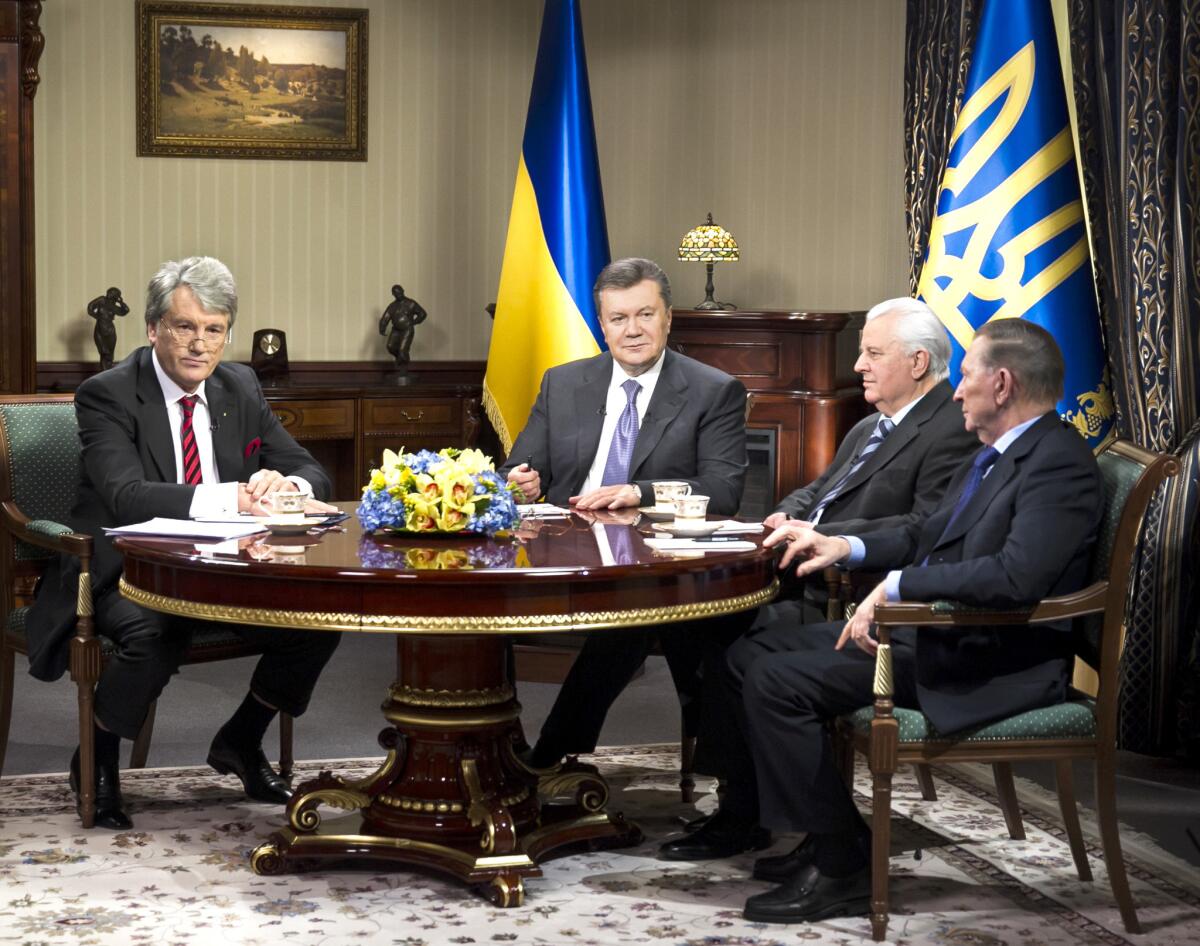Ukraine leaders meet, fail to break stalemate

- Share via
KIEV, Ukraine -- The four men who have served as Ukraine’s presidents since independence held an unusual meeting Tuesday, but failed to break the stalemate in the country’s worst political crisis since its 2004 Orange Revolution.
In a nationally televised round-table discussion with his three predecessors, incumbent President Viktor Yanukovich offered tokens of reconciliation to his political opposition, but nothing that was likely to end the demonstrations that have roiled Kiev, the capital, for nearly two weeks.
The meeting was intended to search for a solution to the political impasse that developed after Yanukovich refused to sign a trade agreement with the European Union on Nov. 29, apparently fearing retaliation from neighboring Russia. His opposition favors closer ties with Europe.
Yanukovich reiterated Tuesday that Ukraine was still moving toward European integration. One of his predecessors, Viktor Yushchenko, suggested that one solution might be to sign a political pact with the EU while continuing to discuss an economic relationship.
Ukraine envoys are going to Brussels on Wednesday to resume negotiations on integration, Yanukovich said as he sat with former Presidents Leonid Kuchma, Leonid Kravchuk and Yushchenko.
“We want to get conditions which would satisfy Ukraine, Ukrainian producers and Ukrainian people today,” Yanukovich said. “As soon as we reach mutual understanding and compromise [my] signature will be there.”
He also promised to release some of the protesters who have been detained during the recent demonstrations in central Kiev.
Yanukovich also reportedly met Tuesday with EU envoy Catherine Ashton, who was dispatched to Kiev to help seek a solution to the political crisis.
The opposition was not invited to the meeting of the presidents, and its leaders were not impressed with the results.
“It was not a dialogue but a monologue on the part of Yanukovich, who once again didn’t say anything the country wanted to hear,” opposition lawmaker Natalia Agafonova said in an interview. “If the president had really wanted a dialogue, he would have met with the opposition and would have come out to the people” in Independence Square.
Overnight, riot police and interior troops, brought by busloads to Kiev from all over Ukraine, dismantled opposition barricades around government buildings and pushed thousands of protesters back to Independence Square.
In a brief overnight clash, 15 protesters and two riot police were reportedly lightly injured. The Interior Ministry also said that 40 police officers had been sidelined with colds, and that two had fainted while on duty.
With snow falling and weather dipping into the single digits, the number of protesters dwindled to about 4,000 from hundreds of thousands on Sunday. Those remaining found warmth wherever they could.
“Our protesters get warm near fires in Independence Square, they regularly get hot food, tea and coffee during the day and they are replaced in time by thousands of new protesters -- while these young soldiers who face us stay all day out in the snow, wind and cold,” Agafonova said. “Protesters often bring hot tea and snacks to the police, who are frozen and miserable and about to pass out.”
Gennady Romanenko, a 31-year-old information technology specialist, was holding a hot glass of tea with both hands to warm them up.
“I come here every night for two to three hours after work,” he said. “I am ready to stay here to the end, but I would like to see at least some results. After all, we have not come out here just for a walk, have we? But up there on the very top no one wants to talk with each other.”
In his round-table meeting, Yanukovich once again bemoaned a natural gas agreement with Russia that was signed by former Prime Minister Yulia Tymoshenko. Tymoshenko is serving a seven-year prison term for abuse of power over her decision to sign the deal with Russia in 2009. One of the EU conditions for signing an integration agreement with Ukraine is that Tymoshenko be freed.
Ukraine can’t pay Russia’s existing price for gas, which is $200 higher than the average European price, Yanukovich said. “Today, Russia is ready to discuss this issue,” he added. An EU economic pact would threaten those discussions.
ALSO:
Israel passes law aimed at deterring African migrants
Rights groups demand investigation into killings of Egypt protesters
Obama navigates tricky diplomatic waters at Nelson Mandela memorial
sergei.loiko@latimes.com
Special correspondent Butenko reported from Kiev and Times staff writer Loiko from Moscow.
More to Read
Sign up for Essential California
The most important California stories and recommendations in your inbox every morning.
You may occasionally receive promotional content from the Los Angeles Times.













